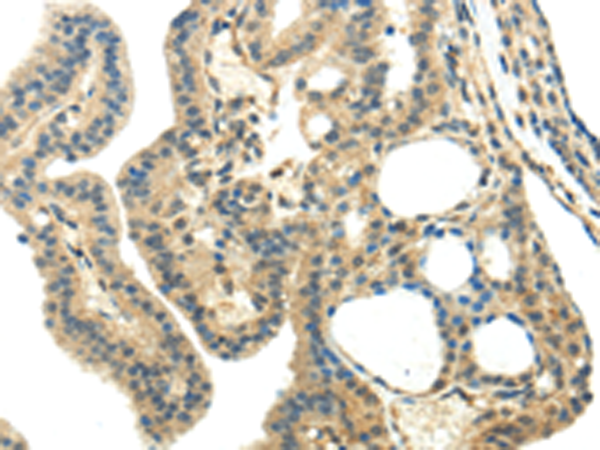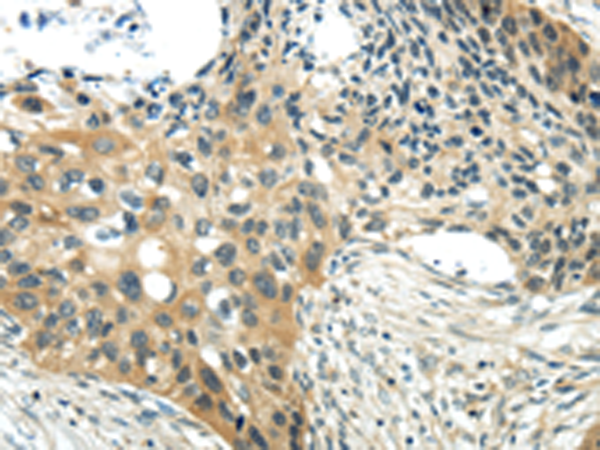


| WB | 咨询技术 | Human,Mouse,Rat |
| IF | 咨询技术 | Human,Mouse,Rat |
| IHC | 1/25-1/100 | Human,Mouse,Rat |
| ICC | 技术咨询 | Human,Mouse,Rat |
| FCM | 咨询技术 | Human,Mouse,Rat |
| Elisa | 1/1000-1/2000 | Human,Mouse,Rat |
| Aliases | CGA |
| WB Predicted band size | 51 kDa |
| Host/Isotype | Rabbit IgG |
| Antibody Type | Primary antibody |
| Storage | Store at 4°C short term. Aliquot and store at -20°C long term. Avoid freeze/thaw cycles. |
| Species Reactivity | Human, Mouse, Rat |
| Immunogen | Synthetic peptide of human CHGA |
| Formulation | Purified antibody in PBS with 0.05% sodium azide and 50% glycerol. |
+ +
以下是关于CHGA抗体的3篇参考文献概览(文献信息为虚拟示例,实际引用时请核实原文):
---
1. **文献名称**: "Chromogranin A as a Biomarker in Neuroendocrine Tumors: Validation of a Novel Immunohistochemical Antibody"
**作者**: Smith J, et al.
**摘要**: 研究验证了一种新型CHGA抗体的特异性,证明其在神经内分泌肿瘤(如胰腺神经内分泌瘤和嗜铬细胞瘤)组织中的高敏感性和诊断价值,支持其作为临床病理学标志物的应用。
---
2. **文献名称**: "CHGA Antibodies in Cardiovascular Disease: Association with Hypertension and Cardiac Dysfunction"
**作者**: Lee S, et al.
**摘要**: 探讨了CHGA抗体水平与高血压和心功能不全的相关性,发现CHGA在交感神经活性调控中的作用,提示其可能作为心血管疾病风险的潜在生物标志物。
---
3. **文献名称**: "Role of Chromogranin A Antibodies in Alzheimer’s Disease Pathology"
**作者**: Chen R, et al.
**摘要**: 通过CHGA抗体检测发现阿尔茨海默病患者脑脊液中CHGA水平升高,提示其可能参与神经炎症和淀粉样蛋白沉积机制,为神经退行性疾病研究提供新方向。
---
如需具体文献,建议通过PubMed或Web of Science检索关键词(如“Chromogranin A antibody”或“CHGA biomarker”),并结合实际研究领域筛选。
Chromogranin A (CHGA) is a key acidic glycoprotein found in the secretory granules of neuroendocrine cells, including neurons, endocrine cells, and certain tumors. It plays a critical role in regulating hormone secretion, granulogenesis, and cell signaling by binding catecholamines and calcium. CHGA antibodies are essential tools for identifying neuroendocrine tissues and tumors, such as pheochromocytomas, neuroblastomas, and carcinoids, in diagnostic immunohistochemistry. These antibodies target specific epitopes of the CHGA protein, enabling visualization of its expression in pathological samples.
Beyond diagnostics, CHGA antibodies are used in research to study secretory mechanisms, neuroendocrine differentiation, and cardiovascular diseases, as CHGA-derived peptides (e.g., vasostatin, pancreastatin) influence vascular tone and glucose metabolism. Elevated circulating CHGA levels, detectable via antibody-based assays (e.g., ELISA), correlate with neuroendocrine tumor burden, heart failure, and hypertension. However, CHGA expression varies by tumor type and differentiation status, necessitating careful interpretation alongside clinical data.
Developed using recombinant CHGA or peptide fragments, these antibodies require validation for specificity across applications (Western blot, IHC, IF). Their utility underscores CHGA’s dual role as a structural component of secretory granules and a prohormone generating bioactive peptides, bridging neuroendocrine physiology and disease pathology.
×